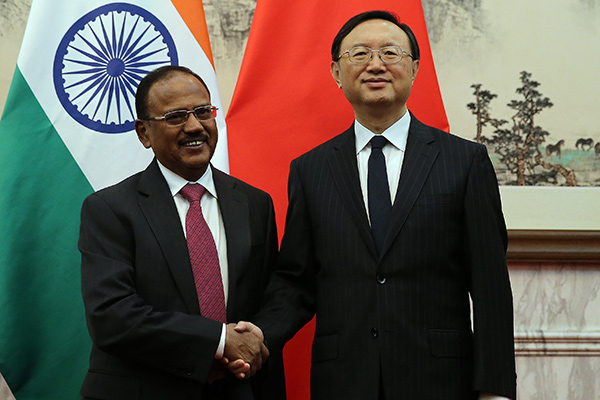
State Councilor Yang Jiechi and India’s National Security Adviser Ajit Doval meet for the 19th round of talks on the border issue in Beijing on April 20.[Photo by Wang Zhuangfei/China Daily]
Border disputes between China and India have been effectively controlled, special representatives from both countries said on April 20.
State Councilor Yang Jiechi and India’s National Security Adviser Ajit Doval made the remarks as they met at the Diaoyutai State Guesthouse in Beijing for the 19th round of talks between special representatives on the border issue.
They also said that “the border area has been peaceful and stable in general”, the Foreign Ministry reported in a news release.
The talks are scheduled to end on April 21.
Indian newspaper The Hindu said the talks are taking place against the backdrop of a “sharp decline in border incidents, following Indian Prime Minister Narendra Modi’s visit to China in May 2015”.
Foreign Ministry spokeswoman Hua Chunying said on April 19 that the talks come at a crucial stage of negotiations on a settlement framework.
She said the two countries will try to work out a fair and reasonable plan that is acceptable to both at an early date.
The two nations began a three-stage process when the special representatives were appointed in 2003.
They first reached an agreement on guiding principles and setting political parameters for a settlement in 2005. The countries are now at the second phase of working out a settlement framework, and the final step will be drawing a border line based on the framework agreement.
Wang Xu, executive deputy director of Peking University’s Center for South Asian Studies, said, “Both Beijing and New Delhi had a stronger will to consolidate bilateral ties after President Xi Jinping’s visit (to India) in 2014 and reached higher consensus on controlling border conflicts.”
“Now what matters is the implementation of such controls,” he said.
India’s Rediff News said Doval traveled to Beijing not merely as a special representative for the border talks, but in a much broader role as the prime minister’s special envoy to discuss a wider range of bilateral relations.
